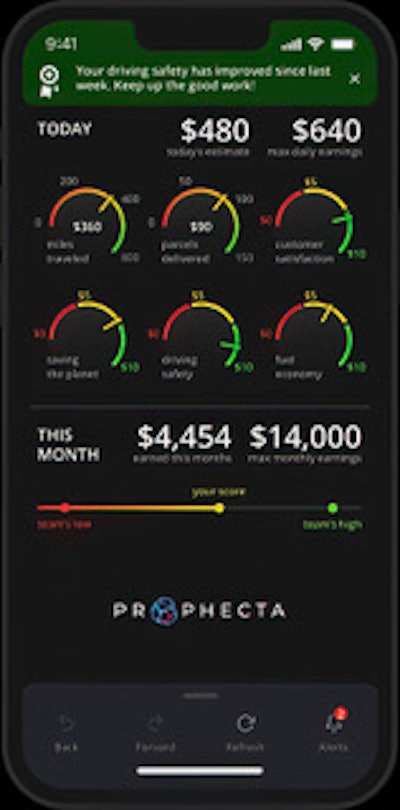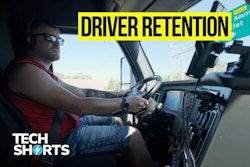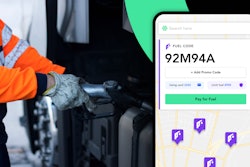
Fleets have data coming out of their ears – data on fuel consumption, driver behavior, maintenance, compliance, and the list goes on and on. It can be overwhelming to the point they don’t know what to do with it, turning what was supposed to optimize operations into a time-consuming, and ultimately monetary, hindrance.
That’s where Prophecta comes in – at least on the fuel data front.
The new Silicon Valley-based artificial intelligence startup, established at the end of 2022, recently rolled out its vehicle tracking algorithm that aims to reduce carbon emissions by correcting and incentivizing cost-conscious and safe truck driver behavior.
The tool, which operates via app on a driver’s phone or in-cab tablet, serves as an extension of the value proposition of existing telematics systems like Geotab, Samsara and others, said Prophecta Chief Technology Officer Anatoly Volkhover.
“Where our system comes into play is that for every vehicle, we have what we call a digital twin, essentially a mathematical model of how the vehicle performs,” he said. “It's very similar to what NASA does for the space shuttle. When any space vehicle flies, there is a certain level of mathematics that computes its trajectory so you can know what the impact on the trajectory will be if you make a 10-second fuel burn, for example. We do the same thing for a truck.”
The tool corrects driver behavior with real-time coaching for optimal performance based on RPM, load and terrain data, among other things.
“The model is what's lacking in the purely telematics solutions that just collect the data. They give you the data, but you don't know if (drivers) are performing well or not,” Volkhover said. “There is plenty of data that's available today … but most of the data requires human analysis, and of course no one ever has the time to do that in detail. It also requires an education of a data scientist to make sense of it. So the AI that we created is essentially a data scientist in the box. It does that work in real time, and there is no limit to how many data streams it can process.”
Volkhover said the model compares optimal performance based on how AI would drive the vehicle versus how the driver is driving the vehicle. The larger the deviation, the more assistance a driver needs. If the deviation is only 5%, Prophecta doesn’t intervene at all, but if the model notes a difference of say 20%, the system then gives drivers advice on how to better operate the vehicle for optimal fuel consumption.
Optimizing operations
Prophecta’s overarching goal is environmental. The company is addressing that with its value proposition of helping fleets retain drivers. How? Save money by optimizing fuel consumption and then returning a portion of that to drivers in the form of incentives. At the same time, it saves money from a safety perspective by coaching drivers in safer driving habits that save on fuel, too.
“To make the drivers love what the system does and not just see it as a big brother tapping on their shoulder saying what to do, what we recommend the companies do is to take those huge savings and channel part of the savings to the drivers in the form of all sorts of incentives and bonuses,” Volkhover said. “So the drivers are getting incentivized for actually learning how to do their job better, and there's no need to allocate and new budget for this because it's a fraction of the money recovered from a more optimal operation.”
Fleets are not required to incentivize their drivers, but there is a function in the app that supports it. Prophecta can map their savings directly on their phone, and when the assistant gives drivers advice, it also provides justification.
“When it says switch off your engine to save fuel, it also says if you keep doing that, there is a bonus of X dollars that awaits you at the end of the month,” Volkhover said. “So that's something that provides immediate positive reinforcement to everything the system does.”
Optimizing the way a driver drives the vehicle is just one function of the system. It also offers navigation that optimizes routes on the fly and can reroute an entire fleet if certain events occur, like bad weather, road closures or accidents. It also tells a fleet how to optimally load cargo. Volkhover said it also provides an operational benefit for fleet managers, allowing them to monitor hundreds of drivers versus four or five by providing alerts that guide their focus to what actually needs attention.
And all of these factors play a role in environmental optimization.
“Funny enough, saving the environment also saves you money because most of the damage comes from burning fuel, and … the less fuel you burn, you both save the environment and you save your costs. So environmental optimization goes hand in hand with financial.”
Prophecta’s prospective
Prophecta is offering its assistant tool in a free version and a paid version that has additional features so fleets get a chance to first see if they even need the tool. The free version can tell a fleet if they have a fuel discrepancy so they can decide if they want to pay for the full version to receive driver assistance.
“Fleets sometimes don't realize they have lots of money wasted in their business processes and we can recover that money for them,” Volkhover said.
Right now, Prophecta’s tool works with other telematics providers, but he said the company plans to roll out a version later this year that will allow fleets to access the tool without a telematics subscription in an effort to onboard smaller fleets that may not be able to afford both.
Volkhover said Prophecta will also eventually expand its offering to other areas of the logistics industry but is focused on fleets first. The company will also develop additional solutions in the future based on market demand, he said.











